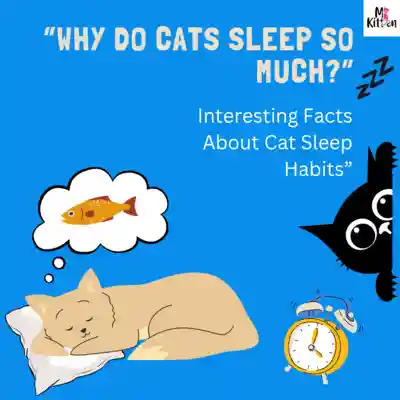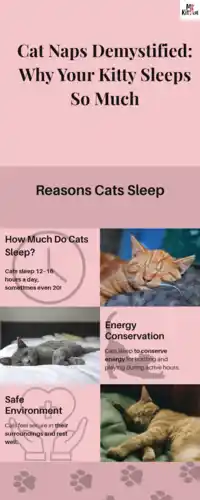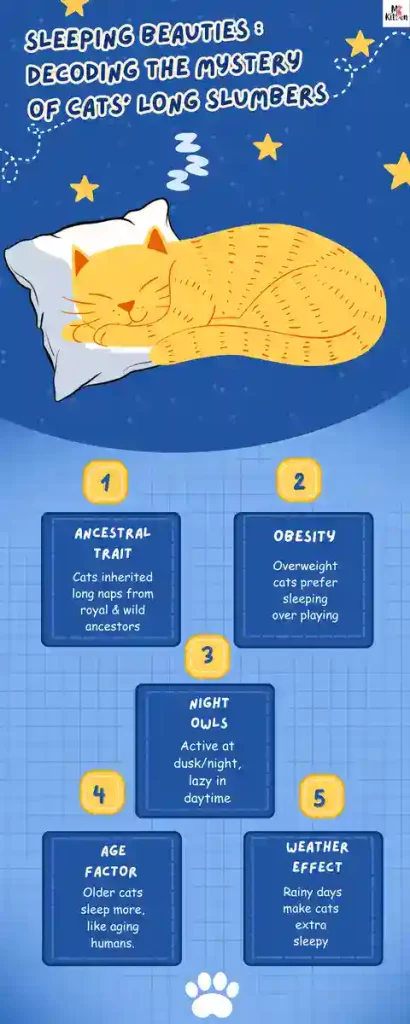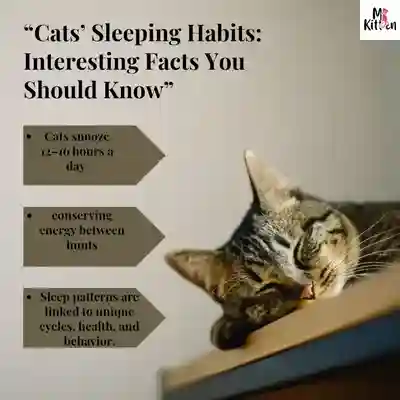Why Do Cats Sleep So Much? Sleeping Facts About Cats
Cats' Sleeping Habits Explained: Surprising Facts
It’s no secret that felines love to snooze, often spending up to 16 hours a day catching Z’s. But what’s behind this adorable yet puzzling behavior? Let’s dive into the fascinating world of cat sleeping habits and uncover some surprising facts.
Their love for napping is rooted in their ancestral heritage, where conserving energy between hunts was crucial for survival. This trait has been passed down through generations, making why do cats sleep so much a question that’s both intriguing and complex.
As we explore the intricacies of feline sleep patterns, you’ll discover that there’s more to their snoozing than meets the eye. From their unique sleep cycles to the factors influencing their rest, we’ll explore it all.
There is no surprise that we spot a cat sleeping or lazing in almost every corner in the house. For cats, nothing is more prior than their sleep. Cats can manage an average of 20 hours’ sleep on one day. The question stays in almost every cat owner’s head; why do cats sleep so much?
Cat Naps Explained: Why Your Feline Friend Sleeps the Day Away
Why Do Cats Sleep So Much? Sleeping Facts About Cats
While it may seem like cats are lazy, their sleeping patterns are actually a testament to their evolution as predators. In the wild, cats are most active at dawn and dusk when their prey is most active. This natural instinct is still present in domesticated cats, who tend to be more active during these times.
However, they also spend a lot of time sleeping or, as some might say, “resting.” It’s not always sleep; sometimes, they’re just conserving energy. This behavior is rooted in their ancestral trait as hunters, where conserving energy between hunts was crucial for survival.
Their wild ancestors didn’t have the luxury of a constant food supply, so they had to be ready to pounce at a moment’s notice. This meant they had to rest a lot to conserve energy. Even though domesticated cats don’t need to hunt for food, they still have this instinct. So, when your cat is snoozing the day away, it’s not being lazy; it’s just following its natural instincts.
Understanding these interesting cat sleep facts can give you a new appreciation for your cat’s behavior. It’s not just about sleeping a lot; it’s about being a efficient hunter, even if that means hunting a toy mouse or two.

The Science Behind Feline Sleep Patterns
Understanding the science behind feline sleep patterns can provide valuable insights into our cat’s behavior. Cats are crepuscular animals, meaning they’re most active at twilight and in the early morning hours. This natural behavior is a leftover from their wild days, when they hunted under the cover of darkness.
As a result, their sleep patterns are adapted to this nocturnal lifestyle. Cats experience short periods of deep sleep followed by longer periods of light sleep, allowing them to wake up quickly if needed. This unique sleep pattern is crucial for their survival instincts, enabling them to rest while remaining alert to potential threats.
How Age Affects Feline Sleep
As cats age, their sleep patterns change. Older cats tend to sleep more than younger cats, and their sleep becomes more fragmented. This means that older cats may wake up more frequently during the night, potentially due to discomfort or the need to adjust their position.
The cat nap duration also varies with age. Kittens and younger cats tend to have shorter naps, while older cats sleep for longer periods. Understanding these changes in feline rest behavior can help cat owners better care for their pets as they age.
In conclusion, the science behind feline sleep patterns is closely linked to their natural behavior as crepuscular animals. By understanding these patterns and how they change with age, cat owners can gain a deeper appreciation for their cat’s needs and behaviors.

Surprising Factors Affecting Your Cat's Snooze Schedule
Your cat’s sleep is influenced by more than just their natural instincts. Factors like obesity can significantly impact their snoozing habits. When cats become less active due to excess weight, they tend to sleep more, altering their usual sleep patterns of domestic cats.
The Impact of Obesity and Weather
Obesity in cats leads to lethargy, making them sleep more than usual. Weather conditions, such as rain, can also make cats more sleepy. The gloomy weather outside seems to make them want to curl up and snooze the day away, affecting their cat snooze tendencies.
Understanding these surprising factors can help you better cater to your cat’s needs. By maintaining a healthy weight and creating a cozy environment, you can ensure your cat gets the rest they need. So, the next time you wonder why cats need so much sleep, consider these factors that influence their sleep schedule.

Sleeping Beauties: Decoding the Mystery of Cats' Long Slumbers
There can be plenty of reasons why your cat is sleeping throughout the day. Despite their sleeping habit most of the owners forget to analyze how much work and exertion do they do throughout the day? From playing fetch to pouncing over couches, our kittens do a lot of exercises. So we better not underestimate them and call them a lazy cat. Read on to know more about why cats fall asleep anytime, anywhere.
1. It Is Maybe Because Of The Ancestral Trait
Some breeds such as Persian cats, have adapted this habit of sleeping and lazing from one of their ancestors who have been crossbred to get them. Such crossbred cats can adapt this laziness trait and maybe that’s why they are not able to resist this feel of sleeping all the time.
Usually, cats are active and witty just like their parents, but there is a possibility that most cats having their roots into royal families have adopted this trait of sleeping endlessly. Back in the time, queens owned kitties to portray them as a sign of royalty. For that, they were made to rest and stay alongside the majesty.
This can be the reason why cats that we know now love to stay indoors and relax most of the time. One more reason could be the genetic evolution in cats that they got from the wild ancestors. Wild cats have a habit of hunting, following, and running behind their prey that takes up a lot of energy. The only time when these cats can revive their energy is by sleeping between two meals.
2. It Is Not Always Sleeping
You cannot always tell by looking at a cat if she is actually sleeping. Most of the time cats are not sound sleeping but are snoozing or lazing with their eyes closed. By doing so, cats take rest while being alert mentally. The only way to identify if a cat is actually sleeping or snoozing is by noticing their ears. If the cat’s ears twitch or move about, that means that cats are not sleeping soundly and are snoozing. Cats have this amazing habit of taking naps even while sitting straight up.
3. Their Day Is In The Night
If you observe your cat carefully, you would find out that the cats become active during the night when it is almost time to sleep. If you are searching for a cat breed especially, Persian cats for sale online, you need to understand this trait as it might shock you at first.
Cats are most active during dusk and prefer sleeping in the daylight. This fact can be surprising as these pets get caught into some trouble or mess things up when you are asleep. And the opposite happens in the day time when you are busy prepping up breakfast, you will find your cat dozing off for a dreamy sleep.
4. It Can Be The Age
While younger kittens are active and playful, their reason for sleeping can be explained as the resting time. But the same does not apply to older cats. Mature and aged cats tend to become lazy and that is why they are found to be sleeping. Just like human beings, cats also become lazy and sleepy in their older age. So when your cat is in their mature age, just make sure they get
enough sleep accompanied by frequent exercises.
5. Your Cat Might Be Fat
Just like human beings, cats tend to gain fat when they adopt the habit of overeating. And when these cats gains weight, they are not anymore interested in playing or going out. Obese cats tend to laze around the house or maybe sleep all day long. Body fat causes laziness and prevents them from going out for a walk or pounce at things.
Such overweight cats like to snore in the owner’s lap or simply find a comfy corner where they can enjoy a lazy afternoon sleep. Although it is important for a furry cat to stay indoors and take rest, the owners might help their pet in surrendering the sleep and play with you to lose that extra layer of blubber.
6. Rains Make Them Sleepy
It would come to you as a surprising fact that cats get affected by the weather. Observed by most cat breeders and owners, cats tend to prefer sleep on a rainy day than usual. A cozy, rainy day would definitely force them to yawn and snuggle up in blanket with you and enjoy the rainy day.
So now when you have come across all the possible reasons behind your dear pet sleeping so much, you must prepare yourself to adopt this habit and plan the schedule accordingly. You may get annoyed by your cat sleeping in the day and being a player at night.
Also Read: How To Help Your Cat Loose Weight
It is recommended that instead of interrupting the cat’s natural sleep cycle, you should try to find out ways that your cat gets exhausted in the day so that they get the night time for sleep. But if your cat is sleeping longer than usual and isn’t still getting enough rest, you should get an appointment fixed with the veterinarian. Oversleeping can indicate illness or some medical issue that your cat is not able to show you.
Also, you can trust your cat’s wit and cleverness as they tend to be active even if you find them sleeping. Cats prefer to be aware of everything at all times and for that, they might simply act as an unaware pet but are actually active. The kitties would never leave an opportunity of being a part of some mischief.


